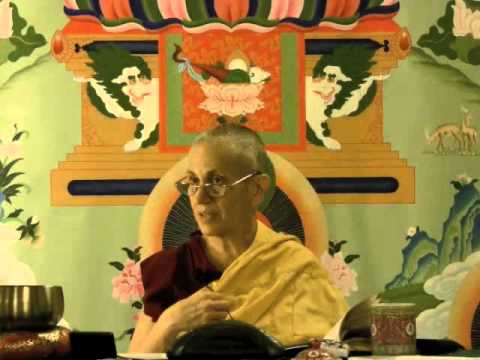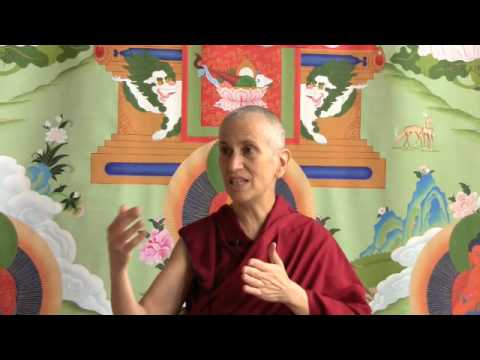Developing self-acceptance
Part of a series of Bodhisattva's Breakfast Corner talks given during the Green Tara Winter Retreat from December 2009 to March 2010.
- We can accept the reality of our past actions without judging ourselves as bad
- Self-acceptance comes through having compassion for ourselves, which is built upon separating the action and the person
Green Tara Retreat 058: Developing self-acceptance (download)
We were talking about things existing by mere designation and that there has to be a suitable basis of designation: that we can’t call anything anything. Even if we label something, it doesn’t mean that it’s that thing because we label lots of things lots of things that they aren’t.
I was thinking about this in terms of developing self-esteem and self-acceptance. We’ve been talking about that the way to develop self-acceptance isn’t by saying that the actions, whatever actions we do, are okay. I don’t know about you. I’ve been telling myself that for a long time: that whatever I do is okay. What this led to was actually a lot of stuffed emotions and a lot of denial of really looking at what I’d done because I just tell myself, “It’s all okay,” in an attempt to feel good about myself. That hasn’t worked very well. It hasn’t gotten me where I want to go.
The idea in self-acceptance is that when we look in the past at the actions that we’ve done, we accept that we have done those, in the sense that that is reality. We understand the person who did them. We have compassion for the person who did them. Yet, realize that some of those actions are the basis of designation for the term destructive karma. Why are they the basis of that term destructive karma? Because they bring about suffering. Therefore, we know we have to purify them, and we go about doing that.
The way to really gain self-acceptance is to differentiate the person and the action. We can say that an action is destructive or constructive or neutral or whatever it is, but that doesn’t mean the person is good or bad. To really separate those out so that we can give an accurate label to the different actions we do, and then know which ones to rejoice at and which ones to purify. During the process of labeling our actions we have to do so without judging ourselves and recall that as a person, the person is ethically neutral. The person is just what’s labeled in dependence on the aggregates. It’s the actions that are constructive or destructive. I think in that way of regarding ourselves, we’re just the agents—so we don’t judge ourselves. Similarly, we don’t judge other people based on the actions that they did. We don’t have to try and make everything okay when it’s not actually okay, because that doesn’t get us where we want to go in terms of the development of our mind.
I think this self-acceptance really comes through having a sense of compassion for ourselves, which is built upon separating the action and the person. Just as when we thought about the teachings on the disadvantages of the self-centered thought that you talk about; we have to separate the self-centered thought as something different from the person. In all these things we have to get very clear, otherwise we label the person on the wrong thing, and then get rather confused.
Audience: The verses in Shantideva are really helpful in that regard, when he talks about the arising of anger because you can see it in your own experience. Anger arises from conditions, seeing this then it doesn’t feel completely like there’s a person there who’s woken up, “I’m going to get angry today!” That’s clearly not what is happening. So I think it’s really helpful experientially to help to make the separation of person from emotion.
Venerable Thubten Chodron (VTC): Yes, exactly, except that we say, “I got angry.” And sometimes we may even think, “Oh, I made the decision to get angry.” But if we investigate it closer, that anger, or even the decision to get angry, all of those happen due to conditions. There’s not some inherently existent agent, that then says, “I’m going to get angry,” or “I’m angry,” or whatever. It’s just due to previous conditions, due to previous training, you know, that then these thoughts or emotions arise. And when you see them like that, like you said, then you realize they aren’t me.
Audience: Also, it doesn’t take you away from wanting to get rid of the causes of anger or whatever.
VTC: Yes. And you can still know that you want to get rid of those things because they’re harmful to you, even though they aren’t you.
Audience: When you say that we are not the action but actually the person is labeled upon many moments of mind and experience in the past. If we go around harming a lot of people, in a sense, in a conventional sense, that is kind of ‘who we are’—a harmful person. Of course ultimately we can’t say that, but ultimately there’s no person apart from that action either. The person isn’t that actions, but there’s no person apart from it ultimately.
But, it just seems like, where my mind goes is like, “Okay, inherently I’m not any of these things but conventionally I’m a bad person because I did do these things; and they really, yes, they really are part of who I am in the sense that they led up to where I am now.”
VTC: You’re saying there’s very much a sense that if I do a negative action then I’m a bad person because those actions led up to who I am and also because society labels us that way. I think this is a fault in society’s label. It’s a collective fault that we have, and that’s what leads to so much judgment of people. That’s what leads just to putting people in categories, and then judging them based on either their actions, or even the color of their skin, or their thoughts, or whatever. This is one of the reasons why in society we have so much bias and prejudice, because we’re giving incorrect labels to things that don’t deserve those labels.
In other words a person who does a bad action is not a bad person because the next moment that person can do a good action. So then, does that person become a good person? Then you get really confused about who you are because one moment I’m bad, one moment I’m good. And also, in looking at one action, one person will tell you that action is good and another person will tell you that action is bad. You know? The same action!
If we’re always associating our self-image with those actions we’re going to get tremendously confused. This is why I think it’s so important to separate those things. The action may be harmful. Why is it harmful? Not because it’s inherently evil, but because it leads to suffering and nobody wants suffering. Why is an action constructive or positive? Not because it’s inherently positive but because it leads to happiness and wellbeing—which is what we all want. The actions can be given those different labels in relationship to the results, the desirable or undesirable results that they give. But we can’t label the person as either evil or good, or whatever.
This is really part of the conditioning that we’ve received since we’ve been little because, how do our parents discipline us? They say, “You’re a good boy.” “You’re a good girl.” “You’re a bad boy.” “You’re a bad girl.” That’s not a helpful way to give children feedback. Lots of times when you say that to a kid, the kid has no idea why their parents are saying that. To the parent, “Oh, Johnny did this, therefore I say he’s bad.” But Johnny doesn’t realize that the parent is upset about this action. When you’re a little kid, you don’t know why your parents are upset. Then when they tell you you’re bad, you go, “I don’t know what I did but I must be bad.” Or they tell us we’re good and again we have no clue why.
I think that in giving kids feedback and in disciplining them, telling them bad or good is really detrimental to their own well-being as well as being unrealistic and incorrect labeling. It’s much better to say, “When you leave your toys all over the place and I trip on them when I’m walking, I don’t like it. Please clean them up.” That’s really what the point is. It has nothing to do with the child being bad or being good, does it? It just has to do with the toys in the way of where people are walking, that’s all. I think that when we look at other people, we have to look at the actions they’re doing and describe and evaluate those without judging the person. Similarly when we look at the actions we do, to evaluate the actions on what the point is but without giving those labels to ourselves. The conventional person is not an appropriate label for “good person” and “bad person.”
Because we receive so much conditioning like this growing up, we’ve internalized a lot of that conditioning and tell ourselves, “I’m good” and, “I’m bad.” There’s a lot of work we have to do in our meditation. This is part of the practice when we talk about introspective awareness; that mental factor that notices when we are giving ourselves these incorrect labels, or giving other people these incorrect labels. Then we have to refocus our mind on what is actually the point, which is the action not the person. This is a process of refining our introspective awareness so that we can detect this kind of stuff as soon as it arises and then correct it without letting our mind get into a session of, “I’m such an awful person,” which is really unproductive and unrealistic. This really has to be a main focus in our practice. It’s to catch these moments when we do this to ourselves or to others because we’re so habituated with it that it just kind of comes naturally like water going downhill.
So we have to catch it and really say, “No. It’s not the person.” In fact the person has buddha nature. So if you’re going to give any label to the person you have to say, “Good.” You can’t say, “Bad.” Correct? Imagine if society as a whole took this kind of view. We would live so much more harmoniously with each other, wouldn’t we? People would be given second chances when they messed up. People wouldn’t get so boxed into identities and groups. We would be so much more tolerant of each other and of ourselves.
Our way to change society is to start with one person. We change the society here at the Abbey and then slowly we start influencing more people whom we come in contact with.
Venerable Thubten Chodron
Venerable Chodron emphasizes the practical application of Buddha’s teachings in our daily lives and is especially skilled at explaining them in ways easily understood and practiced by Westerners. She is well known for her warm, humorous, and lucid teachings. She was ordained as a Buddhist nun in 1977 by Kyabje Ling Rinpoche in Dharamsala, India, and in 1986 she received bhikshuni (full) ordination in Taiwan. Read her full bio.


